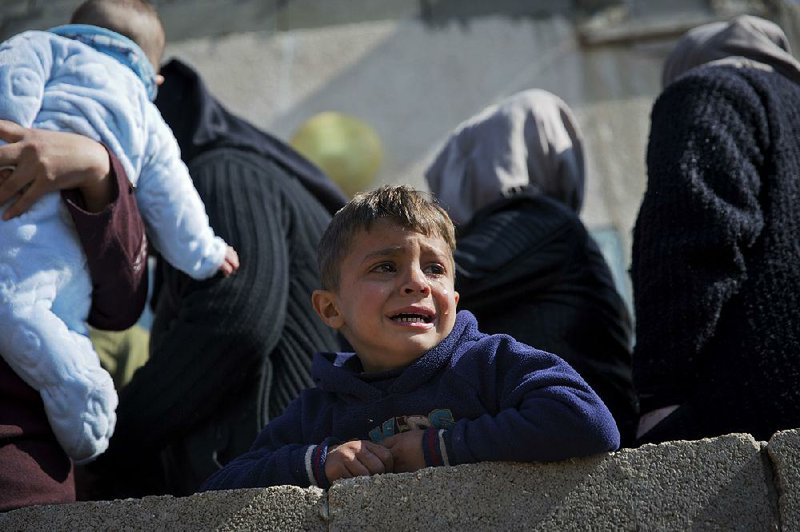JERUSALEM -- Prime Minister Benjamin Netanyahu said Wednesday that Israel will retain security control over the Palestinians as part of any future peace deal, deepening Palestinian fears that Israel and the U.S. are working on a proposal that will fall far short of their dreams of independence.
Netanyahu's statement further exposed a deepening rift that has emerged between the U.S. and Israel on one side and the Palestinians and the Europeans on the other, ahead of an expected peace push by President Donald Trump's administration.
Since taking office, Trump has distanced himself from the two-state solution -- the outcome favored by the international community, including Trump's predecessors, for the past two decades.
Instead, he has said he would support Palestinian independence only if Israel agreed. The European Union, meanwhile, along with the rest of the international community, remains committed to the two-state solution.
These differences were evident at a meeting Wednesday between Netanyahu and the German foreign minister, Sigmar Gabriel.
In one exchange, Gabriel said his country is "very much in favor" of the two-state solution. "I was very thankful to hear that of course also the government of Israel wants to have two states, but [with secure] borders," he said.
Netanyahu broke in with a clarification.
He said Israel's "first condition" would be to control security west of the Jordan River, an area that includes all of the West Bank, the heartland of the Palestinians' hoped-for state.
"Whether or not it is defined as a state when we have the military control is another matter," he said. "I'd rather not discuss labels, but substance."
The Palestinians claim all of the West Bank, east Jerusalem and the Gaza Strip, areas captured by Israel in 1967, for their state. Israel withdrew from Gaza in 2005, but it has settled over 600,000 people in the West Bank and east Jerusalem, making it increasingly difficult to partition the land.
Nabil Abu Rdeneh, spokesman for Palestinian President Mahmoud Abbas, said the Palestinians would not accept the presence of "one Israeli soldier" on sovereign Palestinian lands.
"Either there will be full Palestinian sovereignty or there will be no security, no peace and no stability," he said.
Advocates of the two-state solution, including Israel's opposition parties, have long argued that the establishment of a Palestinian state is essential for Israel's own survival. Without a Palestinian state, they say, the number of Jews and Arabs under Israeli control will be roughly equal.
Israel would then have to choose between granting millions of Palestinians citizenship, threatening the country's status as a Jewish-majority democracy, or turning into an apartheidlike state where Jews and Palestinians have different sets of rights.
The Palestinians have long been suspicious of members of Trump's Mideast team, led by his son-in-law, Jared Kushner, because of their deep connections to Israel and years of support for the West Bank settlement movement.
Those suspicions deepened in December after Trump recognized Jerusalem as Israel's capital. The Palestinians accused Trump of siding with Israel and said they would no longer accept the U.S. as a mediator.
Palestinian officials now claim that Trump's team is working with Israel on a plan that would give them a mini-state in roughly half of the West Bank with Israel retaining overall security control, as well as control over Jerusalem and its holy sites. Final borders and the fate of Israel's dozens of settlements would be decided later. The officials say a third country with close ties to the U.S. recently presented details of the proposal.
When the officials tried to negotiate the terms, they said, they were told it was a "take it or leave it" plan. The officials spoke on condition of anonymity because they were discussing a classified diplomatic issue.
The White House did not immediately respond to a request for comment. Officials have said recently that the White House is still working on its proposal, and they have refused to say when it might be unveiled.
A Section on 02/01/2018
